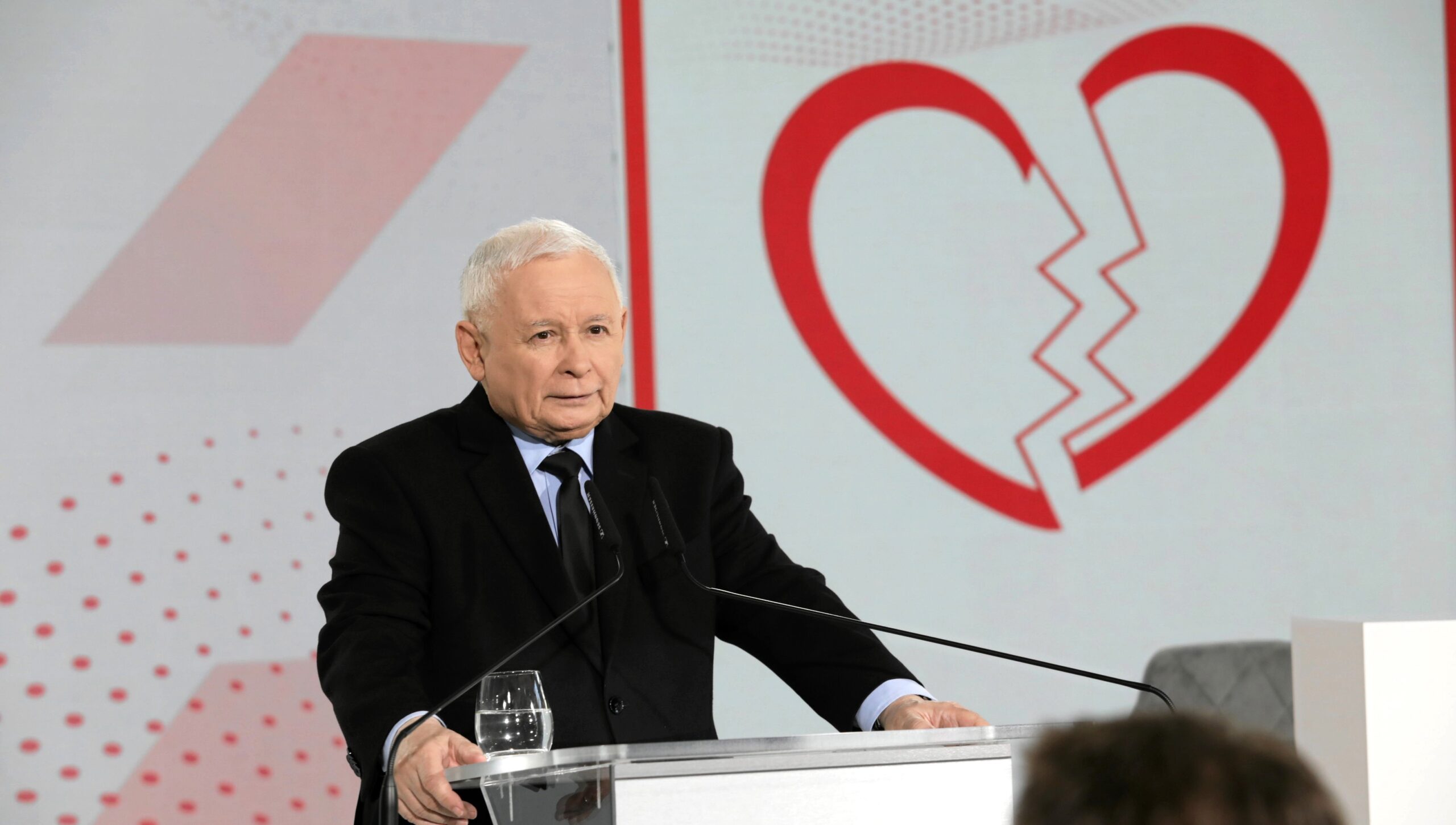Conservative opposition leader Kaczynski willing to support liberalising Poland’s abortion law

Conservative opposition leader Jarosław Kaczyński has indicated he would be willing to support softening Poland’s near-total abortion ban, which was introduced under the rule of his own Law and Justice (PiS) party. But he warns this could only happen by changing the constitution.
The move marks an apparent shift from Kaczyński, who has previously expressed expressed support for the near-total ban. Another leading PiS figure, former Prime Minister Mateusz Morawiecki, has reiterated his own support for softening the law.
Jarosław Kaczyński mówi, że w jego ocenie przepisy o kompromisie aborcyjnym, które obowiązywały do momentu wyroku Trybunału Konstytucyjnego powinny zostać wpisane do konstytucji. – Referendum w kwestiach moralnych nie jest dobrym pomysłem – stwierdził prezes PiS. pic.twitter.com/eBmGqntQTW
— Onet Wiadomości (@OnetWiadomosci) April 12, 2024
On Friday, three bills aimed at ending the near-total abortion ban were put to their first vote in the Sejm, the more powerful lower house of parliament. All of them won a majority of votes – mainly from the ruling coalition – meaning they have passed to committee for further discussion.
Two of the proposed laws – one submitted by Prime Minister Donald Tusk’s centrist Civic Coalition (KO) and another by The Left (Lewica) – would introduce abortion on demand. Both of those were opposed by PiS during voting.
The other was put forward by Third Way (Trzecia Droga), a centre-right group that is part of the ruling coalition alongside KO and The Left. That bill would not go as far as the other proposals, instead restoring the abortion law that existed before the current near-total ban was introduced in 2021.
During voting on Third Way’s proposal, four of PiS’s 181 MPs present voted in favour of it while 21 – including Kaczyński – abstained from voting rather than opposing it. However, the remaining 156 PiS MPs voted against it.
Parliament has voted for bills aimed at ending Poland’s near-total abortion ban to proceed to for further legislative work.
However, they still face a number of hurdles, including differences within the ruling coalition over how far to liberalise the law https://t.co/IIcMnvk0jZ
— Notes from Poland 🇵🇱 (@notesfrompoland) April 12, 2024
Under the pre-2021 law – which was introduced in 1993 and is often called the “abortion compromise” – pregnancies could be terminated in only three circumstances: if they threatened the mother’s life or health; if they resulted from a criminal act such as rape; or if the fetus was diagnosed with a severe birth defect.
In October 2020, the Constitutional Tribunal (TK), a body widely seen as being under the influence of PiS, ruled the latter of those three circumstances – which made up over 90% of legal abortions – to be unconstitutional. It did so at the request of a group of 199 MPs, most of them from PiS.
Kaczyński himself regularly expressed support for ending abortions due to birth defects, which PiS figures have called “eugenic abortions”.
In 2016, Kaczyński declared that he would “strive to ensure that even very difficult pregnancies, when the child is condemned to death, is severely deformed, will end in birth, so that the child can be christened, buried, given a name”.
In 2016 Kaczyński declared: “We will strive to ensure that even cases of very difficult pregnancies, when the child is certain to die, very deformed, still end up in a birth, so that the child can be baptized, buried, have a name”. 1/2
— Marta Kotwas (@MartaKotwas) October 22, 2020
However, on Friday, after the abortion votes had taken place, Kaczyński struck a more conciliatory tone. “I believe that if…the [abortion] compromise from 1993 were included in the constitution, then there would be something to talk about,” the PiS leader told journalists in the Sejm.
“If it were possible, although it is really very difficult, maybe there would be some solution that would calm the situation,” he continued. “At the same time, a law that would have to supplement it would clarify the conditions [under which abortion can take place].”
The TK’s 2020 ruling that introduced the current near-total ban on abortion was issued on the basis that Poland’s constitution protects, among other things, “the life of every human being” and “the dignity of the person”.
In order to change the constitution, a two thirds majority in the Sejm is required, meaning it would need the support of most of the current ruling coalition and PiS.
Mateusz Morawiecki, who led the former PiS government that oversaw the introduction of Poland’s near-total abortion ban, now says he and “many party colleagues” would vote in favour of a proposal by one of the country’s new ruling groups to end that ban https://t.co/wNdM77YgxP
— Notes from Poland 🇵🇱 (@notesfrompoland) February 29, 2024
Meanwhile, after Friday’s vote, Morawiecki, who served as PiS prime minister during the implementation of the current abortion law, reiterated his previously expressed position that the near-total ban was a “mistake” and that he would like a return to the pre-2021 law.
Morawiecki on Friday voted against Third Way’s bill. However, he later said that resulted from a misunderstanding because he was confused as to which order the four abortion bills were being presented.
Speaking to broadcaster RMF, Morawiecki explained that he personally did not like the pre-2021 abortion law but he now realises that introducing an even tougher one could push “the pendulum back the other way” and result in an even more liberal law than existed before.
Opinion polls show that there is strong support for removing the current near-total ban. However, society is divided over whether there should be a return to the pre-2021 law or instead the introduction of abortion on demand. Some, including Third Way leaders, have called for a referendum to decide the issue.
As parliament debates changing Poland’s abortion law, a poll asked the public what MPs should do:
– 35%: legalise abortion on demand up to 12 weeks
– 21%: restore pre-2021 law
– 23%: call a referendum
– 14%: keep the current near-total ban
Via: https://t.co/HVfF56Kuw6 pic.twitter.com/90GTTaDi3u
— Notes from Poland 🇵🇱 (@notesfrompoland) April 12, 2024
Notes from Poland is run by a small editorial team and published by an independent, non-profit foundation that is funded through donations from our readers. We cannot do what we do without your support.
Main image credit: Mateusz Skwarczek / Agencja Wyborcza.pl

Daniel Tilles is editor-in-chief of Notes from Poland. He has written on Polish affairs for a wide range of publications, including Foreign Policy, POLITICO Europe, EUobserver and Dziennik Gazeta Prawna.






